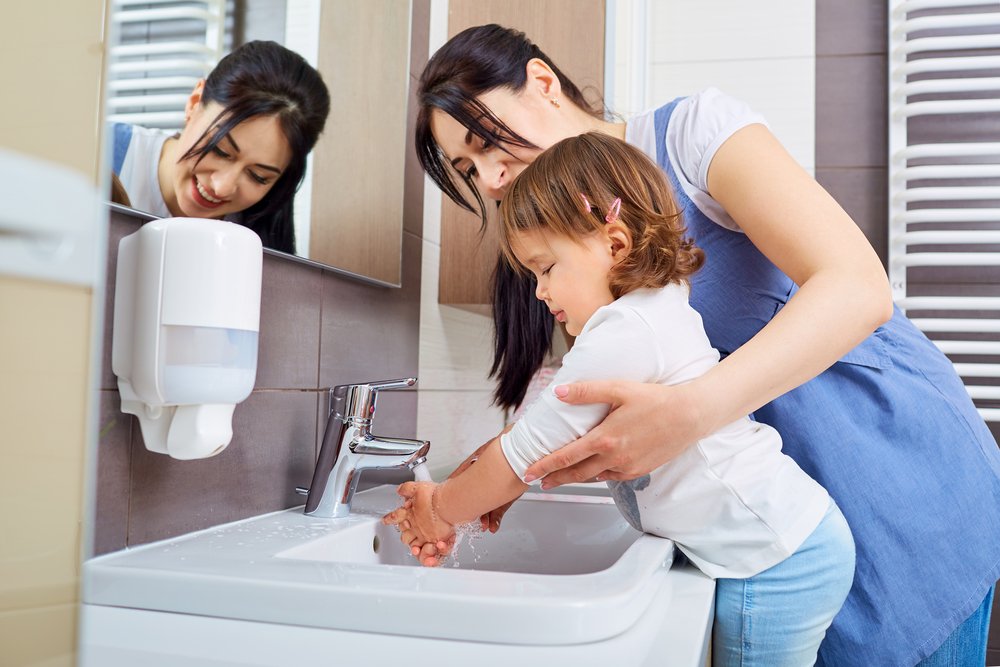Key points:
- Prevention Tips for Families: Stress handwashing, cough/sneeze etiquette, and no face-touching. Manage screen time, disinfect surfaces, and maintain a calm atmosphere.
- Tips for Pregnant Women: Practice social distancing, prioritize immune health with sleep and nutrition. Limited data on COVID-19 in pregnancy, but a Wuhan study showed healthy births. Breastfeeding is okay with precautions. Masks are for the infected. Avoid contact with potential infections.
We’re learning more and more about COVID-19, otherwise known as coronavirus, every day and how it may affect our families. Based on current evidence, children do not have a higher risk of contracting coronavirus nor do they display serious infection symptoms. However, they can still be carriers and should take appropriate safety precautions. Because there’s a lot of information circulating about prevention tips –some true and some false–, we went straight to the source and consulted the American Academy of Pediatrics and the Center for Disease Control and Prevention for the latest in best practices on coronavirus prevention.
Prevention tips for families
- Stress can hurt our immune systems. When talking with your little ones, reassure them that doctors are working as quickly as possible to help everybody feel better.
- Stay focused on the importance of handwashing. Wash your child’s hands with soap and water for at least 20 seconds before starting or after ending an activity. For example, before and after meals, trips to the bathroom, playing outside, touching a pet, etc. If soap and water are not available, use a hand sanitizer that is 60% or higher alcohol-based. Make it fun and easier for your little one to remember and try singing a short song like the ABCs. Here’s a fun video or activity to illustrate the importance of handwashing with kids.
- Teach your child to cough or sneeze into a tissue or into their elbow instead of their hands.
- Emphasize the importance of not touching our faces. Make it a game and give a prize to the winner!
- Screen time is a part of many family’s routines now. Make sure that your child isn’t left unattended with the news on to avoid seeing any disturbing content. We want to stay as calm as possible.
- Remember to clean and disinfect frequently touched surfaces daily. Scientists believe that coronavirus could live on surfaces for up to nine days. Wear disposable gloves or gloves that are only intended for cleaning and disinfecting. To disinfect, use diluted household bleach solutions or alcohol solutions with at least 70% alcohol.
- Prepare a bleach solution by mixing: 5 tablespoons (1/3 cup) bleach per gallon of water or 4 teaspoons bleach per quart of water for smaller quantities.
Tips for pregnant women
- There is little known information about how COVID-19 affects pregnant women. However, we do know that pregnant women have altered immune systems and can be more susceptible to illnesses like the flu. Therefore, pregnant women should be more vigilant about social distancing and caring for their immune systems by drinking lots of water, getting 8 hours of sleep, and eating lots of fruits and vegetables.
- In a recent study, scientists monitored 9 pregnant women with COVID-19 in Wuhan, China. All babies were born healthy with no signs of the virus. However, this is a small sample size.
- As of right now, the Centers for Disease Control and Prevention says breastfeeding is still okay if you have COVID-19 or are suspected of having it. They recommend washing your hands before feeding and wearing a face mask.
- Face masks should only be used by those who are infected or have a suspected infection. They do not prevent healthy people from contracting the virus, rather, they help prevent the spread of respiratory droplets.
- One of the best things pregnant women can do right now is to avoid contact with anyone who may be infected.
Author: Sofia Martinez is a psychologist with a specialty in Early Childhood Development. She’s a certified yoga and meditation instructor, eager to share these techniques with kids and parents. Sofia has spent time working with kids and studying normal development as well as working with kids with special needs, understanding individuality in development. She wants to keep studying ECD so that Kinedu can scale its model to families across the globe.
Editor: Riley Stevenson is a writer and teacher from Portland, OR with a Masters in Media Studies and Education. She’s certified as an English as a Foreign Language instructor and Trauma-Informed Care provider. Riley spent five years working as a language arts teacher in Oregon public schools, where she served as a lead curriculum consultant. She’s interested in the development of early language skills, especially in the area of second language acquisition.









3 Responses
Hi, more like a question then a comment. But it does revolve the COVID-19. My child recently got sick, can’t go back to daycare till he heals. My question is, should he return to daycare after he is healthy? Go back to daycare to continue his growing/developing with other children?
Hi Paulina! Thanks for your comment =) It mainly depends on your doctor’s orders and your decision as a parent. Development can be boosted either at home or daycare, so it’s up to you and your parenting style and, in this case, on your current situation and location. If you have been asked to stay at home, the best will be to comply.